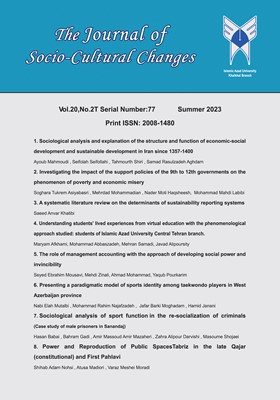Presenting a paradigmatic model of sports identity among taekwondo players in West Azerbaijan province
Subject Areas : Social EvolutionsNabiollah Motallebi 1 , Mohammad Rahim Najafzadeh 2 , Jafar Barghi Moghadam 3 , Hamid Janani 4
1 - PhD Student, Department of Physical Education, Tabriz Branch, Islamic Azad University, Tabriz, Iran
2 - Assistant Professor of Sport Management, Department of Physical Education, Tabriz Branch, Islamic Azad University, Tabriz, Iran
3 - Assistant Professor of Sport Management, Department of Physical Education, Tabriz Branch, Islamic Azad University, Tabriz, Iran
4 - Assistant Professor of Sport Management, Department of Physical Education, Tabriz Branch, Islamic Azad University, Tabriz, Iran
Keywords: West Azerbaijan, Paradigm Model, sports identity, taekwondo players,
Abstract :
For athletes and people who are actively involved in sports, sports identity is a valuable part of their existence that can fulfill their sports identity needs by participating in sports. Sport identity increases with the level of involvement in sport, and a strong sport identity is positively related to sport achievement as well as to higher motivation and competitiveness. The general aim of the research is to present a paradigmatic model of sports identity among taekwondo players in West Azerbaijan province. In terms of the method of a qualitative research, it is of the type of basic theory. The studied community includes members of the Taekwondo Board of West Azarbaijan province, education committees and trainers with national degrees of West Azarbaijan province. Sampling was done by snowball method and continued until theoretical saturation. After implementing the interview texts, selective coding, axial and open codes were extracted and analyzed using MAXQDA software. Finally, a paradigm algorithm was presented. Based on the findings, the paradigmatic pattern of sports identity among taekwondo players in West Azerbaijan province was composed of 4 categories (identification with sports team, sports technical identity, sports social identity and sports moral identity), 8 secondary concepts and 39 primary concepts. The qualitative research paradigm was presented.
_||_


